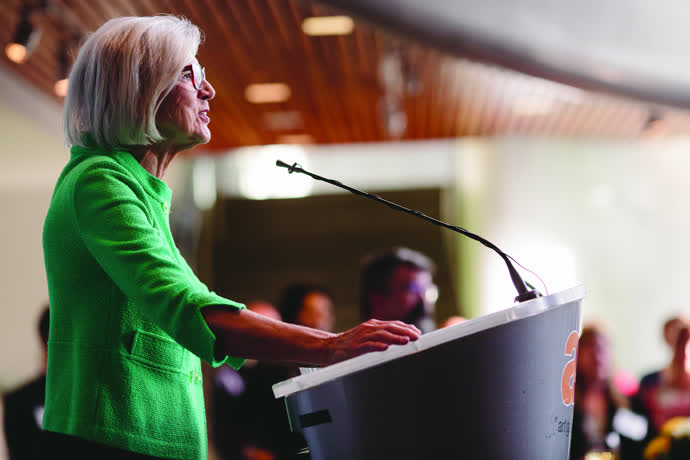
Photo credit: Jessica Handjiev, Joyful Emotion Photography
The fourth floor walls of the Law Centre at the University of Alberta tell a compelling tale of transformation. From the Faculty's first graduating class in 1924 up to well into the 1970s, the young faces immortalized in the mounted grad photo displays are nearly uniformly white and overwhelmingly male. Even in the 1968 display, which notably features a 24-year-old Beverley McLachlin, includes only six other female faces among 62 graduates.
Forty-nine years later, that very same 1968 graduate would address a very different incoming class of UAlberta Law students from the one she entered in 1965. The students assembled for Orientation Day on September 5, 2017 to hear the Former Chief Justice speak were virtually equal parts male and female, and every bit as racially and culturally diverse as modern Canada itself.
It is safe to say that Former Chief Justice Beverley McLachlin has played a major role in fostering this sea change in the law profession in Canada.
"We're thrilled to have been able to start our 2017-2018 academic year with a visit from one of Canada's most accomplished jurists and one of our faculty's most illustrious alumni," said UAlberta Law Dean Paul Paton.
"As Canada's first female Chief Justice and the longest-serving head of our country's top court, she is an inspiration to every one of us at UAlberta Law. Her contributions to constitutional law, human rights and Indigenous law are unparalleled, and her career stands as a testimony to everything we value and promote at the Faculty. We are deeply honoured that she chose to address our students in her final year as Chief Justice."
"A BEACON OF LEGAL RIGHTS"
McLachlin spoke to a packed McLennan Ross Hall in the afternoon of September 5. She was joined by several other speakers, including Law Society of Alberta President Anthony Young, QC, Canadian Bar Association President Jenny McMordie, Alberta Lawyers' Assistance Society Director Judge Robert Philp and Alberta Chief Justice Catherine Fraser.
McLachlin began by recounting the massive changes to Canada's judicial system that she has witnessed since she was a law student.
"When I sat where you are today, Canadian law was still more a product of British colonial tradition than anything authentically Canadian," she said, noting that until 1949 the Judicial Committee of the Privy Council in London still held ultimate power over Canadian judicial matters.
"During my career I've seen the Supreme Court of Canada transform from a sleepy colonial institution to a vibrant, dynamic presence that now stands as a beacon of legal rights, a court that one leading international law scholar in Denmark held up as one of three "alpha courts" worldwide."
In her characteristically plainspoken fashion, Former Chief Justice McLachlin urged the students present to take inspiration from Canada's great legal tradition and carry the torch on behalf of generations to come.
"The law has given me, and will give you, the opportunity to be useful, to do something significant in life. And that is a wonderful thing that will give you satisfaction when you stand where I stand now."
STAR STUDENT, STAR JURIST
Her career story reads like a parade of superlatives. In 2000 she became the first female chief justice of the Supreme Court of Canada (and only the second in the British Commonwealth) as well as the first Alberta jurist to hold this position. In September 2013 she surpassed Sir William Johnstone Ritchie (a John A. Macdonald nominee in 1879) as the longest-serving chief justice in Canadian history.
Much about McLachlin's career would be hard to believe were it not so easily verifiable. Born in Pincher Creek, Alberta in 1943, she completed a degree in philosophy at the University of Alberta before gaining admission to law school on the basis of a letter written to then- Dean Wilbur Fee Bowker - to which he responded with the word's "You're accepted." She proceeded to graduate at the top of her class, and advanced through the legal profession at breakneck speed, achieving her first judgeship in 1980 and appointment to the Supreme Court by Brian Mulroney in 1988.
Appointed chief justice by Jean Chrétien in 2000, she quickly went about changing the culture of Canada's highest court, ushering in a new era of legalese-free communication with the Canadian public and an emphasis on consensus-building among justices. She also helped advance many of the era's most consequential legal causes, including same-sex marriage and consultation laws pertaining to indigenous land. She was also never afraid to court controversy or step on politicians' toes, as she famously did in the case of Stephen Harper's thwarted nomination of Marc Nadon to the Supreme Court in 2014.
In addition to all this, McLachlin enjoyed a lesser known stint as a legal educator, having spent seven years as a law professor at the University of British Columbia while serving as a British Columbia judge.
GENERATION MCLACHLIN
Former Chief Justice McLachlin announced her retirement in June 2017. Her record-breaking tenure as chief justice officially ended in December 2017, nine months ahead of her mandatory retirement age 75. What is next for Beverley McLachlin remains to be seen, but it includes writing. She recently announced her new novel, a legal thriller entitled Full Disclosure, will be published May 1, 2018.
What is certain, however, is that the legacy of Canada's first female Supreme Court Chief Justice will live on well beyond her departure from public life, and that this present generation of Canadian law students and young legal professionals are-and will remain-Generation McLachlin.